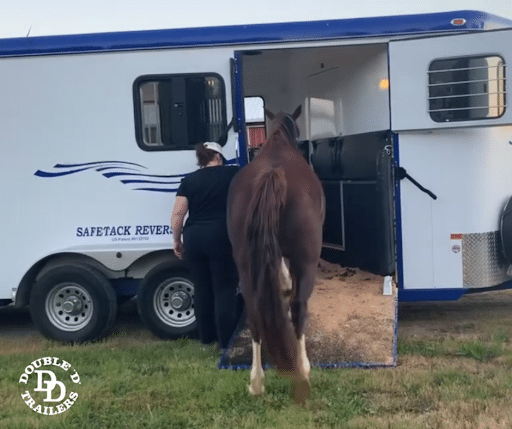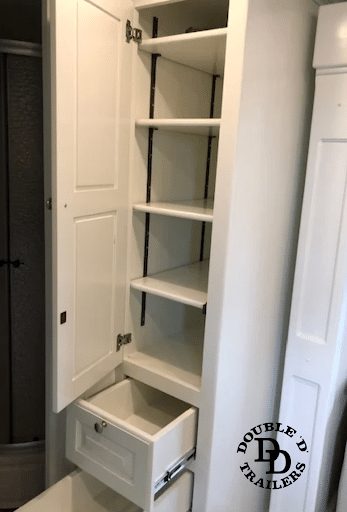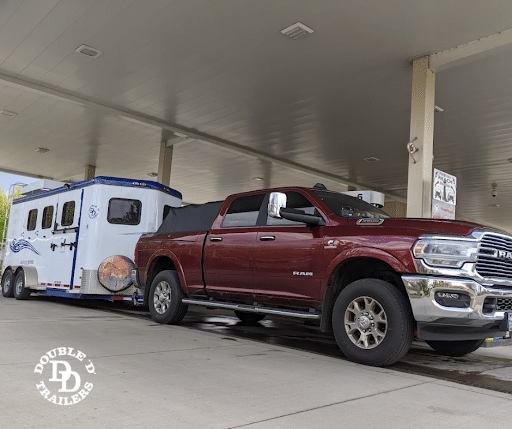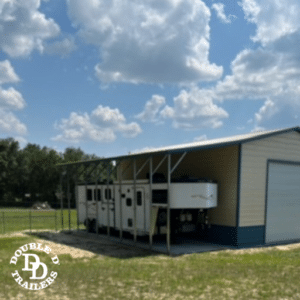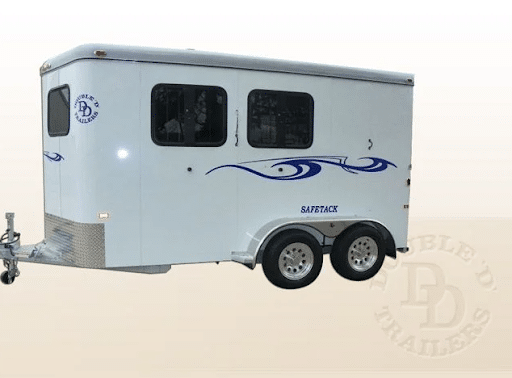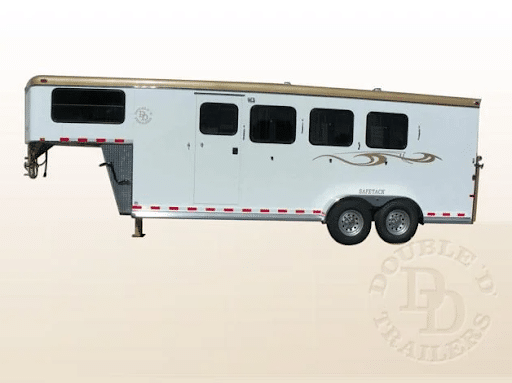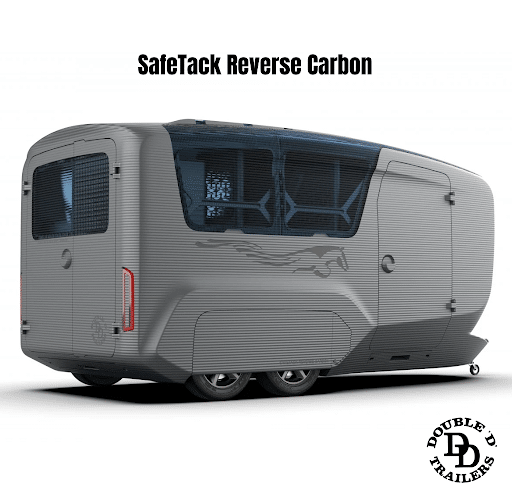Horse Trailer Cost: Prices and Guide on Buying Wisely
So, you're eyeing a horse trailer – but wait, new or used? New ones can be a hefty investment, and if you're new to this, a used option might seem wallet-friendly. Going for a used horse trailer can be smart if you want savings. You'll also get a feel for what you like before splurging on a brand-new one later. Just remember, if you lean towards a used trailer, know that trailer tech has come a long way. A 10-year-old horse trailer won't match the tech and safety of a new one. Don't skimp on safety to save a few bucks.
In the current market, buying a horse trailer wisely also means being aware of the potential depreciation value of your investment, the ease of use, and compatibility with your current towing vehicle. Besides uncovering “hidden” horse trailer costs, conducting a thorough search for current promotions in the market leads to getting the best deal and, therefore, huge savings in your budget.
This guide will walk you through the important stages of your decision-making journey in owning the horse trailer of your dreams - without the nightmare!
3 Factors to Consider When Planning Your Horse Trailer Budget
Let's delve into three essential aspects—price-to-value ratio, ongoing expenses, and depreciation value. This exploration streamlines your research, maximizes efficiency, and empowers you to make a savvy, well-informed decision about horse trailer pricing, saving you both time and energy in the process.
1. Price-to-Value Ratio
Begin by pinpointing your ideal trailer—type, size, features—then compare a range of options. This approach secures the best price-to-value ratio without compromising your must-haves. Sometimes, investing a bit more upfront can secure a significantly superior horse trailer.
2. Initial and Ongoing Costs
To keep costs in check, conduct research on all additional expenses—delivery, taxes, insurance, maintenance, legal fees, monthly payments, and more. Remember, the initial purchase price is merely the starting line. Smart comparisons and attention to detail can lead to substantial savings without sacrificing your dream trailer.
3. Depreciation Value
Unveiling a trailer's depreciation value—a time-consuming yet rewarding endeavor. Scrutinize used trailers, comparing their specs and prices to new ones. Models from reputable manufacturers often retain higher value. This is especially vital if you plan on upgrading every few years.
Common Concerns Related to Horse Trailer Cost
Before you embark on research, let’s address the most common questions relating to horse trailer prices and value.
How long should a horse trailer last?
A well-maintained trailer can serve you for 15 to 25 years, sometimes even longer. Quality, upkeep, and weather exposure play roles in its lifespan. Opting for a new trailer from a reliable manufacturer generally ensures prolonged durability.
Why are horse trailers so expensive?
Expense reflects features, quality, safety attributes, materials, and custom options. Trailer class, type, and layout also influence pricing. A basic 2-horse bumper pull differs vastly from a customized 4-horse living quarters gooseneck model.
What is the most expensive horse trailer?
The most expensive horse trailers, such as customized 31-foot slant load goosenecks with luxurious living quarters, can cost up to a million dollars. Yet, typical 4-horse goosenecks range between $40,000 and $60,000. High-end goosenecks with opulent amenities often hit $100,000-$120,000. Rare custom one-offs can exceed $200,000.
How do people afford horse trailers?
Many opt for financing, securing bank loans or lease contracts. Cash purchases aren't always feasible, especially for larger, feature-rich models. Typically, there are several financing options to choose from when buying a horse trailer from a manufacturer or a dealer. Then again, budgeting plays an important role, which is what this guide from Double D Trailers is all about.
What is the depreciation of a horse trailer?
Depreciation typically ranges from 10% to 20% in the first year and 20% annually thereafter. A decade in, trailers often lose half their value or more. Depreciation parallels price factors—make, model, dimensions, extras, and hitch type.
The journey of purchasing a horse trailer starts with determining your priorities. These come down to personal preferences, needs, habits, and other factors, all of which are general considerations to make before you buy your new horse trailer.
General Considerations To Make Before Buying a Horse Trailer
Setting a budget for your next horse trailer starts with setting a set of criteria tailored to your specific needs. Every owner has unique demands, so comparing options and seeking client feedback helps sift out safety and quality concerns.
Consider these aspects to gauge trailer pricing and create a realistic budget:
- Horse breed and temperament
- Number of horses
- Frequency of travel
- Duration of travel
- Loading/unloading horses
- Entry and exit points
- Space and storage needs
- Vehicle towing capacity
- Trailer storage
- Initial cost of purchase
- Ongoing expenses
 Horse Breed and Temperament
Horse Breed and Temperament
Prioritize the perfect trailer type for your horses. Larger breeds need more space, while temperament determines compatibility. For instance, some horses can’t travel in a center load trailer and face other horses during transportation. Loading and unloading could also be an issue because some horses can’t be backed up easily.
Number of Horses
The number of horses you have or intend to have soon is pivotal for making a decision. Most opt for trailers accommodating two to four horses, but this is your personal choice.
Frequency of Travel
For frequent travelers, consider purchasing from a renowned and reputable horse trailer manufacturer. Extensive use always equals more stress and wear and tear, resulting in heavier maintenance. Quality-built trailers can withstand frequent use a lot better.
Duration of Travel
When traveling on long journeys, you and your horses should enjoy all the comfort possible. Therefore, think about trailers with excellent stall space, living quarters, and sufficient room for storage.
Loading/Unloading of Horses
There are ways to load and unload horses that are better than others. Therefore, you need to know all the variations. You can opt for rear, side, or center loading options, straight or reverse load configurations, and loading ramps and doors to choose from, depending on your horses’ behavior, medical condition, weight, and training.
Double D Trailers’ patented SafeTack Reverse layout allows horses to walk-on and walk-off the trailer, making loading and unloading easier and safer for both horses and handlers.
Entry and Exit Points
The entry and exit points of a horse trailer matter a lot for two reasons: safety and comfort. Go for the configuration that causes less stress on your horses when loading/unloading them and provides a reliable escape route in case of an emergency.
Space and Storage Needs
The interior space and storage compartments that suit you best always depend on the number of horses, tack, and gear you intend to haul, as well as the longevity of the routes and events you plan for.
Vehicle Towing Capacity
Ensure your tow vehicle matches your chosen trailer. Is your existing vehicle going to be used for towing your new horse trailer? If you’re buying a gooseneck, you’ll likely need to set aside an additional budget for a new pickup truck. Neglecting the towing capacity of the tow vehicle and the load capacity of the trailer can result in an accident.
Trailer Storage
Trailer storage is an aspect that first-time horse trailer owners don’t think about initially, but they should. Even a small bumper pull horse trailer needs space to be stored when unused, ideally inside a garage or a barn, to extend its lifespan. If you don’t have the storage space needed, you can opt for a local lot offering garage spaces under rent. A budget-friendly solution to consider is getting a horse trailer cover. For a very reasonable price, you can purchase a cover that will extend the lifespan of your trailer tremendously.
Initial Cost of Purchase
Beyond the price tag, consider taxes, registration, delivery fees, and more. Thoroughly assess deal terms and check them all out before signing a contract.
Ongoing Expenses
Even cheap horse trailers cost money in the long run because of several recurring costs. From the moment you put your new horse trailer to good use, additional expenses will start piling up, such as insurance, taxes, service intervals, consumables such as tires, maintenance (regular cleaning and inspections), repairs, and more. The cost of all these operations depends on the trailer you buy.
What Key Factors Commonly Affect Horse Trailer Costs?
The key factors that affect horse trailer costs are as follows:
- Size and hauling capacity
- Design
- Materials, Construction, and Build Quality
- Condition
- Hitch type
- Brand and model
- Additional Features and Amenities
- Location
In this horse trailer price guide, we’ll describe all of the above factors and explain how and why they affect costs.
1. Size and Hauling Capacity
The primary differences between most trailers are their size and load capacity. A compact 1-horse bumper pull trailer stands in stark contrast to the sprawling dimensions of a 4-horse LQ gooseneck model. Naturally, as size, width, and height expand, so does the price. Large trailers built to accommodate multiple horses, coupled with features like living quarters and tack rooms, necessitate extensive engineering, specialized materials, and intricate assembly processes.
2. Design
The design of a horse trailer significantly impacts its final price. Models with superior design not only exhibit a more appealing exterior but also provide a more convenient interior compared to basic, function-focused models.. The investment in trailers with higher-quality design often translates to a higher price point, reflecting the value of improved user experience and aesthetics.
3. Materials, Construction, and Build Quality
At the core of a horse trailer's worth resides its construction quality and the materials used. Safety takes precedence, tying in directly with quality. The primary purpose of every horse trailer is to transport horses and humans safely, and safety is most often connected to quality. The higher the quality is, the steeper the price will be due to all the engineering, research, material processing, build times, and other factors that separate top-quality horse trailers from the rest.
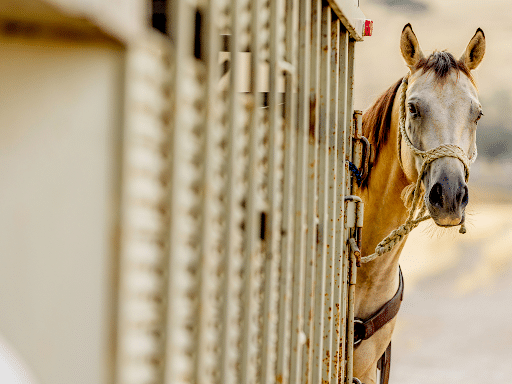
- Types of materials used for the production of horse trailers
Materials vary from commonly used alloy steel to Double D Trailers’ patented Z-Frame. The process it stands for uses zinc and chromate to form a special coat on all the steel tubing incorporated in the trailer, strengthening it, and making it rust-resistant and far more durable than other types of metal used for building horse trailers. Then, there are aluminum and composite horse trailers. Some models comprise variations of all materials mentioned in this section, and they are often the most expensive ones.
- Manufacturing processes and technologies
With advanced production methods come better quality and longevity, which equals higher prices. Every detail of the entire build can make a big difference: the roof, the insulation, the coating, and more. High-quality trailers usually boast unprecedented safety, which is a good enough reason to choose them regardless of the typically higher prices. But. the introduction of groundbreaking technologies doesn’t have to be super expensive. For example, Double D Trailers' 3D-printed horse trailer, showcases innovation's potential to revolutionize the market without exorbitant price hikes.
- Customized and hand-built trailers
Most horse trailer manufacturers still utilize processes where a significant part of the work is done by hand. Proper production monitoring and control results in spot-on quality. When it comes to custom-built horse trailers, the possibilities are almost endless: uniquely designed living quarters, additional features of all sorts, custom layouts, and extra safety options for horses and humans result in one-of-a-kind horse trailers that are typically the most expensive of them all.
4. Condition
For those eyeing the allure of used horse trailers, one crucial factor demands attention: their condition. A trailer's appearance can be deceiving; it can appear fresh even after a decade or show signs of wear that deem it unsafe. We've discussed the lifespan—15 to 25 years—hinging on maintenance. A 10-year-old trailer could maintain value if well-kept, yet expect heightened repair expenses. Used trailers seldom carry warranties, meaning that every costly repair comes out of your pocket.
If you can’t decide between buying a new or a used horse trailer, consider several factors, as follows:
- Purchase costs
Compare the asking price and additional expenses (taxes, registration, delivery, technical inspection, servicing, and so forth) and calculate the value of both trailers after several years.
- Running costs
Calculate the ongoing expenses of both trailers for the period you intend to use either of them. The final number will give you an idea of the total costs you cover for the time you own either of the trailers.
- Repairs, customization, and overhauling
Some buyers prefer to buy a cheap used horse trailer and completely overhaul it to meet their requirements. This could sometimes be as costly as ordering a new, custom-built horse trailer.
5. Hitch Type
The hitch type of horse trailers is another indicator of their price. There are three hitch types to consider:
1. Bumper Pull Horse Trailers:
-
- Common and affordable
-
- Pricier, often using a gooseneck hitch type.
3. 5th Wheel (i.e., a gooseneck with a 5th wheel hitch):
-
- Pricier, often using a gooseneck hitch type.
Typically, gooseneck horse trailers are more expensive than bumper pull horse trailers. 5th wheel and semi-truck horse trailers are the most expensive when comparing stall area and other features, but they are the least sought-after models.
6. Brand and Model
When you review comparable horse trailers from different manufacturers, you’ll notice substantial price differences. Quality, not just brand or model, drives this. While budget models suffice, higher quality translates to improved comfort, safety, and longevity. Opting for reputable manufacturers like Double D Trailers, Featherlite Trailers, Sundowner, Exiss, or Elite Trailers often ensures a wise investment.
7. Additional Features and Amenities
As already mentioned, additional features and amenities can skyrocket the price, but having separate tack and hay rooms, several loading/unloading ramps and doors, better-equipped individual stalls, and lavish living quarters are most often worth the steeper price.
8. Location
Don't overlook the trailer's location. Buying online from afar racks up expenses. Shop local or negotiate a delivery fee reduction. Some manufacturers, like Double D Trailers, offer flat-rate shipping, reducing costs across U.S. states. Cutting expenses can be as simple as cutting the distance.
What are the Additional Costs of Horse Trailer Ownership?
The additional costs of purchasing any new or used horse trailers are as follows:
- Trailer Registration and Taxes
- Licensing Fees
- Insurance
- Trailer Maintenance
- Vehicle Maintenance
- Storage
- Financing Options
New buyers often neglect these additional costs. It’s best to check all of them in advance because you need to include every expense in your budget.
Trailer Registration and Taxes
Different trailer types have different registration requirements. State legislations play a pivotal role here. Reach out to your local DMV for clarity on process and fees. You can also tap into your dealer's knowledge base for insights. This encompasses registration fees, purchase taxes, road taxes, additional licenses when applicable, and more.
Licensing Fees
Consider the size and capacity of your trailer; it might entail extra licenses, including your driver’s license. Familiarize yourself with the necessary permits, trailer laws and state regulations.
Insurance
Insurance is not just an option; it's often mandatory by law. The cost varies based on your horse trailer type and your location. As you explore the market, remember these key questions:
How much does insurance typically cost for a horse trailer?
Expect an average annual cost of $350-400 for horse trailer insurance.
What factors influence the cost of insuring a horse trailer?
The make and model, market value, your travel distances, driving record, storage location, and more contribute to the value of insurance.
Trailer Maintenance
Owning a horse trailer necessitates upkeep costs. Keeping it in prime condition comes with its share of financial commitments:
- Regular cleaning: If you don’t have the conditions to clean your trailer properly, you will need to take it to a car wash. It’s important to clean the undercarriage and the stall after every trip to prevent damage and rust.
- Frequent inspections: Even if your trailer seems fine, you should have a specialist inspect it often to avoid issues and accidents. A full inspection includes structural and suspension checks, as well as brakes, lighting, security features such as safety chains and a breakaway system, and more.
- Servicing: Every horse trailer needs to be serviced according to the manufacturer’s recommendations. Services costs include labor, spare parts, and consumables such as fluids, tires, braking system components, lights, and more.
Vehicle Maintenance
Your towing vehicle needs to be maintained as regularly as your horse trailer, if not more frequently. Any towing vehicle experiences additional stress when pulling a horse trailer, even when it’s within its towing and loading capabilities. Whether it’s an SUV or a pickup truck, consistent technical inspections and servicing are essential for safe towing.
Storage
Limited space for storing your horse trailer can lead to renting parking spots, adding significant annual costs. Anticipate these expenses when formulating your budget.
Financing Options
Trailer financing's cost can considerably amplify the price of the horse trailer. Before signing a lease contract, thoroughly understand your future payment plan, factoring in interest, taxes, and fees. Often, these additional costs wield a more substantial influence on your budget than you anticipate.
Sample Computations of an All-Inclusive Horse Trailer Cost
As previously stated, prices for similarly sized trailers of the same type vary greatly. For instance, you can buy a 2-horse gooseneck trailer that can cost a lot less than $50,000, but you can opt for a similar one that’s priced north of $100,000. The staggering difference is derived from all the factors listed so far in this guide, including all additional expenses.
Standard, Brand New 2-Horse Bumper Pull Horse Trailer Overall Cost
| Feature | Value |
|---|---|
| Size and capacity (Additional horse area length, height, width) | $1,200 - $4,000 + |
| Loading configuration (Slant load, reverse load, rear or side loading ramps) | $3,000 - $8,000 + |
| Material (Aluminum, alloy steel, fiberglass, or combination) | $5,000 - $10,000 + |
| Storage (Wall organizers, separate compartments, etc.) | $300 - $2,000 + |
| Other features and amenities (Awning, floor mats, tack truck, etc.) | $900 - $7,000 + |
| Subtotal (Average horse trailer cost) | $22,000 - $55,000 + |
| Registration & taxes | $0 - $900 + |
| Licensing fees | $0 - $1,000 + |
| Insurance (Annual on average) | $350 - $450 |
| Yearly trailer maintenance (Service, tires, etc.) | $900 - $3,000 + |
| Yearly vehicle maintenance cost (Cost of ownership) | $6,000 - $10,000 + |
| Common financing options | 20-30% of the asking price for an average period of 3-5 years + 5-7% origination fee |
| Overall Cost of Horse Trailer Ownership | $30,000 - $63,000 |
Double D Trailers’ Best Value and Most Popular Model
Customers often buy the SafeTack 2 Horse Bumper Pull Trailer due to its price-to-value factor. This horse trailer offers the ultimate blend of quality and affordability. Because this trailer is designed for both horse comfort and safety, you’ll be investing wisely. PLUS this model:
- makes loading easier for problem loaders
- versatility to be able to forward or rear face horses
>> CHECK OUT THE SAFETACK REVERSE 2 HORSE BUMPER PULL TRAILER
Standard Brand New 2-Horse Gooseneck Horse Trailer Overall Cost
| Feature | Value |
|---|---|
| Size and capacity (Additional horse area length, height, and width) | $1,400 - $13,000+ |
| Loading configuration (Slant load, reverse load, SafeTack) | $3,000 - $8,000+ |
| Material (Aluminum, alloy steel, fiberglass, or combined) | $5,000 - $10,000+ |
| Storage (Wall organizers, separate compartments, mid-tack, etc.) | $300 - $8,000+ |
| Other features and amenities (Living quarters, awning, floor mats, tack trunk, etc.) | $1,300 - $15,000+ |
| Subtotal (Average horse trailer cost) | $49,000 - $85,000+ |
| Registration & taxes | $0 - $900+ |
| Licensing fees | $0 - $1,000+ |
| Insurance (Annual on average) | $350 - $450 |
| Yearly trailer maintenance cost (Service, tires, etc.) | $900 - $4,500 + |
| Yearly vehicle maintenance cost (Cost of ownership) | $7,000 - $12,000 + |
| Common financing options | 20-30% of the asking price for an average period of 3-5 years + 5-7% origination fee |
| Overall Cost of Horse Trailer Ownership | $57,000 - $97,000 |
Double D Trailers’ Most Popular Gooseneck Model
The 3 Horse Gooseneck Slant Load Trailer with Sleeping Quarters is the most popular gooseneck model here at Double D Trailers. Customers often choose this option due to its reasonably priced enhanced safety features as well as its unique qualities that provide:
- more accessibility with the double side ramp option
- independent access to all 3 horse stalls
Average Horse Trailer Prices: New and Used
The following horse trailer pricing guide features average values of standard models regardless of particular brands. As established by Jessica Legan, C.P.A., in her insightful article on horse trailer depreciation for Sapling, well-maintained used trailers tend to come at a 20%-50% discount from their original price.
The realm of new horse trailer pricing, however, is a tapestry woven with several threads. The final price hinges on factors such as size, load type, hitch type, material composition, and more. Moreover, the manufacturer’s name plays its role in shaping the cost. Renowned brands, known for their quality, generally command higher prices – a reflection of their worth.
How Much Do New Horse Trailers Cost on Average?
The cost of new horse trailers varies based on multiple factors, including the type of hitch. Here are the average prices for common types of horse trailers, considering additional costs:
- Bumper pull horse trailers: $10,000 - $40,000+
- Gooseneck horse trailers: $25,000 - $50,000+
- Living quarters horse trailers: $30,000 - $100,000+
- 5th wheel horse trailers: $50,000 - $120,000+
- Semi-truck horse trailers: $60,000 - $150,000+
When it comes to financing, your choices matter. Depending on factors like payment terms and interest rates, using financing services can add around 20% to the total cost. This projection is based on an average financing term of 24-36 months.
Average Bumper Pull Horse Trailer Prices (New)
The following table contains examples of average new bumper pull horse trailer prices. All values listed below are based on horse trailer base prices and do not include any of the additional costs we discussed earlier in this guide.
| Size and Load Type | Material | Manufacturer | Base Price |
|---|---|---|---|
| 2-horse straight load | Steel/aluminum | Gore Trailers | $26,062 |
| 2-horse straight load | Aluminum | Kingston | $29,248 |
| Single horse straight load | Z-Frame, Galvalite, aluminum | Double D Trailers | $30,418 |
| 3-horse slant load | All-aluminum | Sundowner | $43,074 |
| 2-horse reverse load | Fiberglass, carbon | Double D Trailers | $79,300 |
Average Gooseneck Trailer Horse Trailer Prices (New)
The following table contains examples of average new gooseneck horse trailer prices. All values listed below are all based on horse trailer base prices and do not include any of the additional costs we discussed earlier in this guide.
| Size and Load Type | Material | Manufacturer | Base Price |
|---|---|---|---|
| 3-horse slant load | Z-Frame, steel | Double D Trailers | $42,025 |
| 4-horse straight load | Aluminum, steel | Logan Coach | $47,057 |
| 3-horse slant load | Aluminum, steel | Bison Trailers | $47,178 |
| 3-horse slant load | Aluminum, steel | Cimarron | $49,812 |
| 6-horse head-to-head | Aluminum, steel | Shadow Trailer | $90,487 |
Average Living Quarters Horse Trailer Prices (New)
The following table contains examples of average new LQ horse trailer prices. All values listed below are all based on horse trailer price tags and do not include any of the additional costs we discussed earlier in this guide.
| Size and Load Type | Material | Manufacturer | Base Price |
|---|---|---|---|
| 3-horse reverse load | Z-Frame, Galvalite, aluminum | Double D Trailers | $80,944 |
| 3-horse slant load | All-aluminum | Bison Trailers | $106,008 |
| 3-horse slant load | All-aluminum | SMC | $155,834 |
| 4-horse slant load | All-aluminum | Bloomer | $176,018 |
| 4-horse slant load | All-aluminum | Cimarron | $200,551 |
How Much Do Used Horse Trailers Cost on Average?
The cost of used horse trailers varies widely, spanning from around $2,000 to well over $100,000. However, it's challenging to define an exact price range without specific criteria. Factors such as trailer type, size, load style, age, condition, make, and model play a significant role in determining the price of a used horse trailer.
Much like the Kelly Blue Book for cars and trucks, the Horse Trailer Blue Book offers assistance in assessing the value of used horse trailers. However, to arrive at the most accurate and fitting price for your used horse trailer, thorough research within the used trailer market, based on the trailer's specific criteria, is recommended whether you're buying or selling.
Average Bumper Pull Horse Trailer Prices (Used)
The following table contains examples of average used bumper pull horse trailer prices. All values listed below are all based on horse trailer price tags and do not include any of the additional costs we discussed earlier in this guide.
| Size and Load Type | Material | Manufacturer | Base Price |
|---|---|---|---|
| 2-horse straight load | Galvanneal | Bee, 2015 | $12,995 |
| 2-horse straight load | Steel/aluminum | Trails West, 2012 | $15,995 |
| 2-horse reverse load | All-aluminum | Double D Trailers, 2018 | $23,500 |
| 5-horse slant load | Steel | Elite Trailers, 2013 | $31,500 |
| 2-horse slant load | All-aluminum | Harmar, 2022 | $36,500 |
Average Gooseneck Trailer Horse Trailer Prices (Used)
The following table contains examples of average used gooseneck horse trailer prices. All values listed below are all based on horse trailer price tags and do not include any of the additional costs we discussed earlier in this guide.
| Size and Load Type | Material | Manufacturer | Base Price |
|---|---|---|---|
| 3-horse slant load | Steel/aluminum | Bison Trailers, 2001 | $16,995 |
| 3-horse slant load | Steel/aluminum | Exiss Trailers, 2001 | $17,995 |
| 4-horse slant load | All-aluminum | Bloomer, 2016 | $48,000 |
| 6-horse slant load | All-aluminum | Cimarron, 2021 | $85,000 |
| 8-horse head-to-head | All-aluminum | 4 Star Trailer, 2021 | $118,000 |
Average Living Quarters Horse Trailer Prices (Used)
The following table contains examples of average used LQ horse trailer prices. All values listed below are all based on horse trailer price tags and do not include any of the additional costs we discussed earlier in this guide.
| Size and Load Type | Material | Manufacturer | Base Price |
|---|---|---|---|
| 3-horse slant load | Steel | Trails West, 2008 | $29,995 |
| 3-horse slant load | All-aluminum | Dream Coach, 2005 | $49,995 |
| 3-horse slant load | All-aluminum | Lakota Trailers, 2012 | $49,995 |
| 3-horse slant load | All-aluminum | Shadow Trailer, 2019 | $59,995 |
| 4-horse slant load | All-aluminum | SMC, 2022 | $87,987 |
Tips for Saving on Horse Trailer Cost
Saving money on horse trailer purchases requires being well-informed and ready to invest time in comparing options and conducting thorough research. Consider the following strategies to make the most of your budget:
1. Prioritize Essential Features
When shopping for new or used horse trailers for sale, create a list of must-have features and technical specifications. Include factors like interior height, headroom, and loading ramp in your priorities. When opting for a horse trailer with living quarters, carefully plan the amenities you need such as the dining, kitchen, sleeping, and shower areas.
2. Find Deals and Promotions
Invest time in finding deals and promotions. Many online trailer stores and dealerships offer email notifications tailored to your preferences, allowing you to be alerted about relevant offers. Patience can pay off when you wait for the right trailer to come along at the right price.
3. Consider Repossessed Horse Trailers
Banks and insurance companies occasionally sell repossessed horse trailers at prices well below market value. Explore specialized websites and online auction portals to find significant potential savings.
4. Book Rentals
Two rental options exist: either rent a trailer when needed instead of purchasing one, or buy a trailer and rent it out to fellow equestrians. Both approaches offer potential cost savings depending on your usage.
5. Share Trailers with Friends or Riding Clubs
If your trailer can accommodate more horses than you currently own, consider sharing it with friends or riding club members. Sharing transportation costs while retaining the benefits of having your own trailer can be a win-win situation.
Are Stock Trailers Good Alternatives to Save on Horse Trailer Cost?
While stock trailers can be cost-effective, safety concerns must be addressed. They are exceptions rather than the rule. Most stock trailers lack essential safety features like stall dividers, wall padding, and adequate ventilation. Additionally, the flooring quality in stock trailers often doesn't match that of high-quality horse trailers. Therefore, thorough consideration of safety features is crucial when contemplating stock trailers as alternatives to save on horse trailer costs.
Where to Find the Best Prices on Horse Trailers
When searching for favorable prices on horse trailers, two options stand out: visiting local dealerships in person or exploring online platforms specializing in horse trailer sales.
When browsing horse trailers online, consider customer feedback alongside enticing offers. The credibility of dealers can often be distinguished by reviewing client testimonials. 5 popular online platforms and dealers worth considering are Horse Trailer World, Horse trailer Trader, Horse Trailer Classifieds, EquineNow, and Horse Pro Trailers.
Regardless of the method you choose, the potential to secure a great deal on both new and used trailers exists. Some dealerships represent horse trailer manufacturers and provide their product lineups at factory prices. Thorough price comparisons and financing evaluation are essential to pinpoint the optimal price for your desired horse trailer.
One of the best alternatives to investing wisely in a horse trailer is a custom horse trailer. Opting for a custom-built trailer allows you to tailor the design to your specific needs, ensuring every feature aligns with your requirements. Moreover, a custom horse trailer can offer a unique blend of functionality and aesthetics, potentially enhancing its resale value in the future.
5 Ways that Double D Trailers Maximizes Horse Trailer Value for Buyers
When it comes to prioritizing both horse and rider safety, Double D Trailers stands out in the crowded horse trailer industry. Our approach to design and innovation has not only revolutionized the way horse trailers are made but also added considerable value to our products. Here's a look at five ways Double D Trailers has increased the worth and reliability of our horse trailers:
1. Innovating with the Patented SafeTack Reverse Design
Double D Trailers' unique SafeTack Reverse design has set a new benchmark for horse trailer construction. This patented design features a swing-out tack compartment, simplifying the loading and unloading process. It eliminates the common obstructions experienced with traditional slant-load horse trailers, ensuring that the horse can enter and exit without any hindrance. This innovative design not only enhances the safety for the horse but also adds convenience for the handler, effectively increasing the trailer's value.
2. Ensuring Durability and Longevity
Recognizing that horse trailer owners view their trailers as a long-term investment, Double D Trailers employs robust materials and construction techniques. Our commitment to quality ensures that each trailer withstands the test of time, resisting wear, tear, and weather conditions, ensuring a longer lifespan and, consequently, a higher resale value.
3. Prioritizing Horse Safety and Comfort
For Double D Trailers, the safety and comfort of horses are paramount. Our trailers are designed to minimize stress during travel, with features like ample ventilation, padded interiors, and adjustable dividers. A comfortable horse is a calm horse, reducing the risk of injury during transportation and ensuring peace of mind for the owner.
4. Offering Customization for Every Individual Need
Understanding that every horse owner has unique needs, Double D Trailers offers a wide range of customization options. Whether it's incorporating advanced ventilation and lighting systems, specialized tack rooms, or adaptable dividers, we ensure that every customer gets a trailer tailored to their specific requirements.
5. Championing Sustainable Manufacturing
In line with global trends toward sustainability, Double D Trailers has shown a commitment to “green” practices. The concept of eco-friendly horse trailers might seem unusual, given that they don't have engines like cars or consume as much energy as a regular home. However, Double D Trailers is pioneering a shift towards sustainability in the industry.
We've significantly reduced the use of harmful chemicals and paints in our trailers. Instead, we utilize materials like Z-Frame, which is zinc-coated, and aluminum. We combat rust and enhance the trailer's longevity by opting for a chemical bonding process over traditional bolts. Our SafeKick walls are crafted from Polylite, a recyclable material, and our most sought-after flooring option, Rumber, is made from recycled tires.
With the introduction of our innovative 3D-printed horse trailer lineup, we're reducing our environmental footprint and offering trailers that are lighter and more durable.
Navigate Horse Trailer Cost Confidently With Our Comprehensive Guide
Determining an average trailer cost is complex due to the variety of sizes, load capacities, comfort features, materials, and technologies available. Each detail and option impact prices in the diverse world of horse trailers.
However, buying a horse trailer involves more than price considerations. It's a comprehensive process necessitating thorough research and consideration of upfront and hidden costs, depreciation value, and user-friendliness.
Our guide equips you with the knowledge to secure the best price when purchasing a new or used horse trailer. With this insight, you're now prepared to make a wise investment and ready to obtain optimal value and quality for your money. Ready to dive deeper?

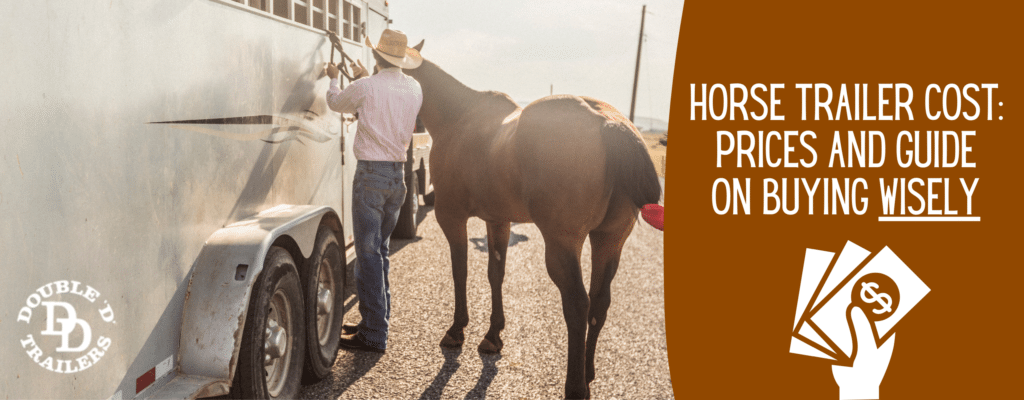
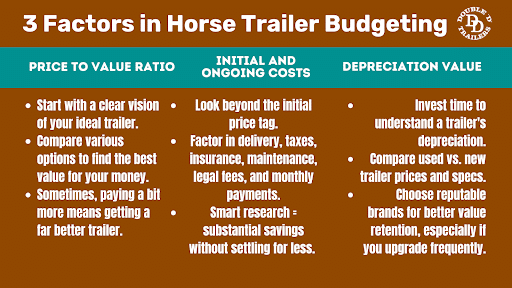
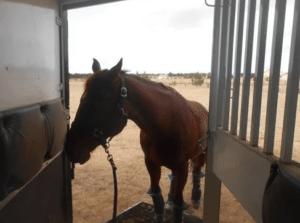 Horse Breed and Temperament
Horse Breed and Temperament
